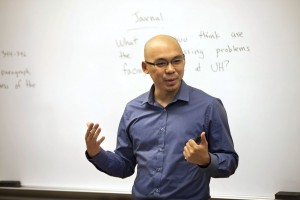We love security. We love feeling safe.
We love the feeling we get when we’re walking on campus and see a security guard or police officer.
We also appreciate the idea of security cameras, but to a point.

David Delgado/The Daily Cougar
Take for instance the Apr. 15 Boston Marathon bombing. Two brothers, Tamerlan and Dzhokhar Tsarnev, left two bags packed with explosives that killed three and injured 264. A few days later, Tamerlan died in a shootout with police and Dzhokhar was captured.
The speed with which the capture happened was surprising, and it was in part because the city of Boston had cameras positioned throughout the streets.
The cameras captured the images that the FBI released on Thursday. The idea that the surveillance cameras captured their every action is heralded as a triumph of modern society, though the idea that “big brother” might always be watching is an unsettling thought.
Philosopher Thomas Hobbes famously described the ‘social contract’ that people have with their government in the “Leviathan.”
“People lose the right to any power over their government once they give authority to that government.”
In other words, to have the safety of law and order, the people pay with some of their personal freedoms. The line must be drawn at one point or another, and the argument to allow cameras on every street corner will only lead to the reduction of more personal freedoms.
It might be surprising to know that there are 490 security cameras on campus that record 24 hours, 365 days a year.
Malcolm Davis, assistant vice president for UH Public Safety and Security, said in a post on the UH Department of Safety website that the cameras were put in place to reduce crimes on campus.
“The safety of our campus community is the driving force of UHDPS,” Davis said. “Reducing the opportunity for individuals to commit crimes on campus is crucial to providing a safe learning and working environment. This is the primary reason we are implementing a plan to install additional video security cameras in selected area.”
The City of Houston boasts about 350 cameras downtown. After what happened in Boston, Houston officials are adamant that the surveillance system in Houston needs to expand.
In Apr. 18 Houston Chronicle article, City Councilman C.O. Bradford, a former HPD police chief, asserted the need to expand and improve Houston’s system.
“They may have some cameras, but they don’t have the technology they should have,” Bradford said. “We cannot staff adequately to protect our large arenas and venues where people congregate every day in this city, but technology is a force multiplier.”
While major cities have a surveillance system network, the U.S. lags behind some European and Asian countries. Hsiao-Ming Wang, professor of criminal justice at the University of Houston-Downtown, said in a Houston Chronicle article that people don’t like being watched, which is why there aren’t more cameras.
“A lot of people think the installation of cameras is privacy invasion,” Wang said.
Wang indicates a larger point, which is that America is vastly different from European and Asian countries. The incursion of surveillance cameras plays into the fear of tyranny that Americans have fought against. The ‘social contract’ described by Hobbes doesn’t apply in America because the government only has the power that the people give it.
The suspects were caught not only because of the surveillance video on a Boston street, but because citizens were recording and snapping photos. In the end, it was the people who pulled off a concerted effort to identify and assist the investigation, which just proves that power should always lay with its citizens.
opinion@thedailycougar.com









